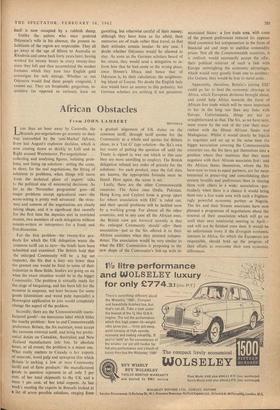African Obstacles
From JOHN LAMBERT .
BRUSSELS
LESS than an hour away by Caravelle, the Brussels pre-negotiations go serenely on their way untroubled by the 'anti-Market' fall-out, from last August's explosive decision, which is now coming down so thickly to Left and to Right around Westminster. Pre-negotiations . . . collecting and analysing figures, isolating prob- lems, and lining up solutions: setting the scene, in short, for the real negotiations, the fitting of solutions to problems, when things will move from the technical plane of experts' talks to the political one of ministerial decisions. As far as the 'November programme' goes—all major problems except agricultural ones—the scene-setting is pretty well advanced : the struc- ture and content of the negotiations are clearly taking shape, and it is significant that recently for the first time the deputies met in restricted session, two members of each delegation without minute-writers or interpreters for a frank and free discussion.
For the first problem—the twenty-five pro- ducts for which the UK delegation wants the common tariff cut to zero—the briefs have been submitted and examined. The British hold that the enlarged Community will be a big net importer, the Six that a duty any lower than the present one would be fatal to some of their industries in these fields. Studies are going on on what the exact situation would be in the bigger Community. The problem is virtually ready for the stage of bargaining, and has been left for the moment in suspense, not least because for some goods (aluminium and wood pulp especially) a Norwegian application to join would completely change the aspect of the problem.
Secondly, there are the 'Commonwealth manu- factured goods'—an innocuous label which hides the touchy problem : how to end Commonwealth preference. Britain, the Six maintain; must accept the common external tariff, and bring her prefer- ential duties on Canadian, Australian and New Zealand manufactures into line. In absolute terms, at all events, the problem is a minor one. What really matters to Canada is her exports of minerals, wood pulp and newsprint (for which Britain is seeking a low or zero Community tariff) and of farm products: the manufactured goods in question represent in all only 5 per cent. of her total shipments to the UK and a mere I per cent. of her total exports. At last week's meeting the experts in Brussels looked at a list of seven possible solutions, ranging from a gradual alignment of UK duties on the common tariff, through tariff quotas for the Community as a whole and quotas for Britain alone, to a 'List G' type solution—the Six's own last resort of putting the question off until the Treaty is signed (a way out which in this case they are Most unwilling to employ). The British delegation refused any order of priority for the solutions : for each product, once the full data are known, the appropriate formula must be found. Here again, the scene is set.
Lastly, there are the other Commonwealth countries. The Asian ones (India, Pakistan, Hong Kong and Ceylon) form a group apart for whom association with EEC is ruled out, and their special problems will be tackled soon by a working group. For almost all the other countries, and in any case all the African ones. the British view put forward recently is that the enlarged Community should offer them association—just as the Six offered it to their African associates when they attained indepen- dence. The association would be very similar to what the EEC Commission is proposing as the new shape of the Community's link-up with its associated States: a free trade area, with some of the present preferences reduced (to appease third countries) but compensation in the form of financial aid and steps to stabilise commodity prices. Not all the Commonwealth countries, it is realised, would necessarily accept the offer, their political mistrust of such a link with Europe outweighing the economic advantages, which would vary greatly from one to another : like Guinea, they would be free to stand aside.
Apparently, therefore, Britain's joining EEC could go far to heal the economic cleavage in Africa, which European divisions brought about, and could help Africa towards the form of African free trade which will be more important to her in the long run than any links with Europe. Unfortunately, things are not so straightforward as that. The Six, as we have seen, must renew by the end of the year their asso- ciation with the fifteen African States and Madagascar. Whilst it would clearly be logical to negotiate and set up at the same time the bigger association covering the Commonwealth countries too, the Six have got themselves into a position where they maintain that they must negotiate with their African associates first : and the African States themselves, whom the Six have now to treat as equal partners, are far more interested in preserving and consolidating their present benefits and preferences than in sharing them with others in a wider association—par- ticularly when there is a chance it would bring them into a free trade area with such a frighten- ingly powerful economic partner as Nigeria. The Six and their Sixteen associates have now planned a programme of negotiations about the renewal of their association which will go on until their next ministerial meeting in April— and will not be finished even then. It would be an unfortunate irony if the divergent economic interests in Africa, for which the Europeans are responsible, should hold up the progress of their efforts to overcome their own economic differences.

































 Previous page
Previous page